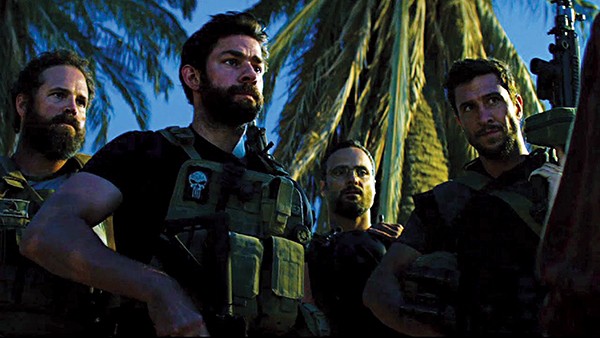During the interminable screening of 13 Hours: The Secret Soldiers of Benghazi, I had a lot of time to contemplate the phenomenon of Michael Bay. Since the director’s 1995 debut Bad Boys launched Will Smith’s acting career and earned $141 million on a $19 million budget, his films have consistently been hugely profitable. The third and fourth films in his Transformers series grossed more than $1 billion each.
Yet, Bay is, by any other measure, a terrible director. Not just bad — Ed Wood bad. He can compose a slick image, but he seems either completely indifferent or actively hostile to logic, continuity, and empathy. This is a man who, in Pearl Harbor, had Ben Affleck get on a train to travel from New York to London.

Manscaping and McDonald’s product placement in 13 Hours
As I watched the 16th or so identical sequence of identical white guys machine-gunning undifferentiated brown Libyans, I achieved insight into the Great Bay Conundrum: He’s a commercial director. Not a director of commercial films, but actual advertisements stretched out to feature length. So who better to direct 13 Hours, a film about the September 11, 2012 riot/attack on American outposts in Benghazi, Libya, that left ambassador Christopher Stevens and three others dead? Since the incidents happened in the middle of President Obama’s reelection campaign, the Fox News commentariat made it a cause célèbre, alleging conspiracy on the part of Obama and then-Secretary of State Hillary Clinton to cover up … something. They’re never clear on quite what, even after a witch hunt that has gone on for three years.
13 Hours is a typical Bay disaster, full of what would be called rookie mistakes had they been made by anyone else. Instead of telling the story of the battle through the eyes of one soldier—excuse me, security contractor—he takes on six, all of whom are muscle-bound, self-described “alphas” sporting identical, meticulously groomed beards. I took eight pages of notes trying to make sense of who’s who, but to no avail. So when a few of these identical-looking guys die or are gravely wounded, there’s no emotional connection. Bay seems to be vaguely aware that’s a problem, so he periodically stops the action to let them Skype with their six identical-looking families back home. One of the wives tells her husband she’s pregnant while in the midst of a McDonald’s product placement scene. For Bay, sympathy is just another form of branding.
Despite the excess of protagonists, there is no clear antagonist, just masses of “tangos” swarming the walls of civilization, which makes 13 Hours more like a zombie movie than a war movie. Bay wants to make sure you get that, so someone exclaims “I feel like I’m in a fucking horror movie!”
The real bad guys, of course, are liberals, represented by that most left-wing of figures, a CIA agent (David Costabile), who speaks in an NPR voice. Ambassador Stevens (Matt Letscher) is portrayed as a grandstanding jerk who won’t listen to the wisdom of our bearded, gun-freak heroes, until he dies a martyr to the Romney campaign.
Bay’s contribution to the steady moral decay of the American hero is putting “security contractors” — meathead mercenaries who reminisce about the good old days in Iraq — at the center of his film and expecting us to react to them like they were uniformed soldiers. Jack Silva (John Krasinski) laments that he keeps getting sent by his leaders to foreign lands to “die in a battle he can’t understand in a place he doesn’t care about.” Well, too bad. He’s a mercenary killing for money, not a soldier fighting for his country. If he doesn’t like it, he can just get another job — and indeed, in the end, he quits to become an insurance adjuster.
There’s nothing wrong with making a political film, even one whose screenplay was apparently written by a Commercial Appeal commenter, but at least American Sniper was a skillfully executed piece of right-wing agitprop. 13 Hours is a mostly boring, occasionally infuriating attack ad targeting Hillary Clinton. It’s Bay the ad man, getting back to his roots.